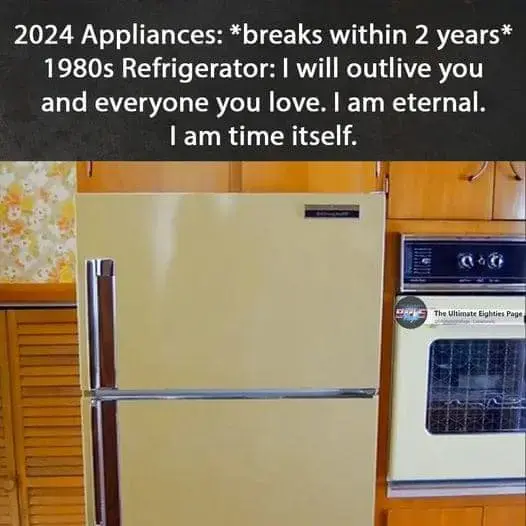this post was submitted on 19 Oct 2024
178 points (100.0% liked)
Jokes and Humor
6215 readers
3 users here now
A broad community for text and image based jokes, humor, and memes.
This community's icon was made by Aaron Schneider, under the CC-BY-NC-SA 4.0 license.
founded 2 years ago
MODERATORS
you are viewing a single comment's thread
view the rest of the comments
view the rest of the comments

So, I learned something interesting about the technology underpinning refrigerators once. In my case, it was an old HVAC AC unit.
We had it checked once, and the tech said the until was really old, but seemed fine. It turns out the old units lasted forever, because they were made with heavy duty materials - thick steel, etc. The downside was that the efficiencies were really low. He said it was a trade-off: you get higher efficiencies by using thinner metal with better thermal conductivity, but you sacrifice durability. Basically, it's a trade-off between durability and efficiency. Whatever built-in obsolescence you get is on top of an essential limitation in physics: it takes more energy to transfer heat between thick metal and thin, and thin just doesn't last as long.
I'm not a materials scientist, so I'm probably paraphrasing him wrong and misinterpreting it, but since his advice was to not replace it until it died, which could be another decade, unless I had an urgent desire to get a higher efficiency unit, I figured he wasn't BSing me and took him at his word.
I absolutely believe in planned obsolescence, but I also believe that there are some fundamental laws of physics contributing to lifespan of appliances. If you want high efficiency (in some types of appliances, such as refrigerators), you're generally going to be working with more flimsy materials which are more prone to breaking down.
I suspect that the higher efficiency don't make up for the irreparability and subsequent waste of replacing appliances more often, but Energy Star contributed to requiring some of that, so not all of the blame can be laid on manufacturers.
I dunno if that is true of refrigerators. Newer fridges have more electronic components, vs just a compressor and some simple mechanics on older fridges. The cooling tech on fridges hasn't changed much, but the extra amenities sure have.
Yea, for appliance components like compressors, thinner materials has practically no impact on performance (but probably saves a little money on manufacturing, and probably reduces life span).
For the condenser and evaporator, it could make a difference, but those have been largely optimized probably since the 60's - they're not complex things. Even there, a thinner wall on the tubing isn't really going to make a major improvement, since it's fin density that really matters.
It's controls that break 98%+ of the time. A refrigeration circuit is pretty simple, so long as you don't poke a hole in the system, generally it will continue to work.
Of all the systems I've worked on, I've rarely replaced even a compressor (it does happen). Condensers and evaporators practically never wear out - almost all that I've replaced have failed from being hit by something, or being cleaned with an unfriendly chemical (some newer ones are really fragile, and even conventional ones don't like dog urine on them constantly). A family friend has been an HVAC guy since I was little (he taught me), and this squares with his experience.
Controls are #1, seals are second (especially on automotive systems, since they get shaken around constantly and deal with much greater temp swings).
"New" stuff (starting in the 80's) has shit electronic controls - they're manufactured as cheaply as possible (unlike say electronic controls for a car engine or safety systems, which have to meet regulatory requirements). Old school controls are so simple there's little to go wrong.
The "new" DC/inverter compressors are probably the biggest improvement in recent years, since they can run at varying loads instead of just off/on - this should make them noticeably more energy efficient.
I know some recent Samsung fridges had issues with compressors getting frost build up on the outside causing damage. Wonder if that is a result of thinner/cheaper materials.